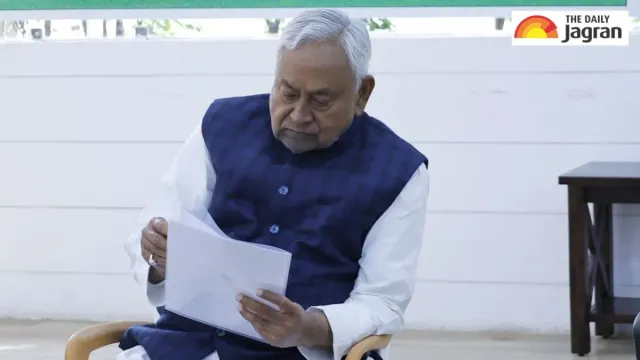- By Nidhi Giri
- Thu, 20 Nov 2025 01:54 PM (IST)
- Source:JND
Bihar Chief Minister Nitish Kumar's legislative career exemplifies political experience and administrative efficiency. He contested assembly elections and served as Chief Minister, serving as a Member of the Legislative Council (MLC) since 2005. In 2024, he was elected to the Legislative Council for the fourth time.
According to jagran.com, political analyst Om Prakash Ashk says that whether he contests elections or not, Nitish Kumar remains the universally accepted leader of Bihar. Harnaut has been his traditional seat. He has lost elections from here twice and won twice. His last victory from an assembly constituency came in 1995. He has not contested direct assembly elections since. This approach allows him to dedicate more time to administration by moving away from electoral processes.
Participation In Assembly Elections
1977: Contested from Harnaut assembly seat, but was not elected.
1980: Contested from Harnaut seat, lost.
1985: Elected from Harnaut (Nalanda) seat.
1995: Elected for the second time from Harnaut seat.
Elected MP 6 Times, Served As Railway Minister In Vajpayee Govt
Nitish Kumar played an active role in central politics after 1995. He was elected to the Lok Sabha six times, including in the 1989, 1991, 1996, 1998, 1999, and 2004 elections. From 1989 to 2004, he worked actively at the centre and held important positions in Atal Bihari Vajpayee's government, including Minister of Agriculture and Minister of Railways.
Membership In Legislative Council
After becoming Chief Minister in 2005, Nitish Kumar opted for the Legislative Council, which allows him to focus on governance.
Legislative Council Tenure Of Nitish Kumar
2006: Became a member for the first time.
2012: Became a member for the second time.
2018: Became a member for the third time.
2024: Became a member for the fourth time.
ALSO READ: Bengaluru Power Cut Till November 23: 4-Day Shutdown Announced By BESCOM; Check List Of Areas
Constitutional Importance Of Bihar Legislative Council
The Bihar Legislative Council is the upper house of the bicameral legislature, constituted under Article 171 of the Indian Constitution and consisting of 75 members. It ensures checks and balances in the legislative process.
This system ensures expertise and diverse representation, allowing administrators to utilize their capabilities. Members are selected from various quotas.
One-third: Elected by the Assembly members.
One third: Elected by members of local bodies.
One twelfth: Elected by the graduates.
One twelfth: elected by teachers.
One sixth part: Experts in the fields of art, literature, science etc. nominated by the Governor.

